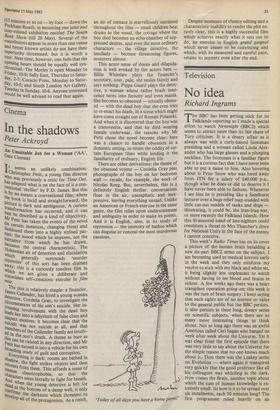Cin ema
In the shadows
Peter Ackroyd
An Unsuitable Job for a Woman ('AA', Gate Cinema)
It seems an unlikely combination: Christopher Petit, a young film director who was previously a critic for Time Out, has adapted what is on the face of it a con- ventional 'thriller' by P.D. fames. But this Is by - no means a conventional film; where the book is lucid and straightforward, the Picture is dark and ambiguous. A curious transformation has occurred, and it can hest be described as a kind of objectivity. Mr Petit has taken the events of the novel Om certain instances, changing them) and fashioned them into a highly stylised pat- tern: the mood which he imposes, not the
becomes from which he has drawn, 11olmesian the central characteristic. The
nolmesian air of detection and elucidation which generally surrounds 'murder alYsteries' of this sort has been drained away; this is a curiously toneless film in which we are given a deliberate and sometimes self-conscious exercise in film noir.
The plot is relatively simple: a financier, James Callender, has hired a young woman detective, Cordelia Gray, to investigate the circumstances of his son's suicide. Her in- creasing involvement with the dead boy cads her into a labyrinth of false clues and suspect motives: it becomes clear that the suicide was not suicide at all, and that Members of the Callender family are involv- ed. in the son's death. A theme as bare as
us an can be twisted in any direction, and Mr
_Petit has turned it into a vehicle for his own brooding study of guilt and corruption. . shEverYthing is dark: rooms are bathed in r acicA', the light strikes objects and then ,etreats from them. This affords a sense of intense claustrophobia, so that the characters seem literally to fight for breath. ',mid When the young detective is left for :rad at the bottom of a damp well, it only Infirms the darkness which threatens to envelop all of the protagonists. As a result,
an air of menace is marvellously sustained throughout the film — small children beat drums in the wood, the cottage where the boy died becomes an echo-chamber of sup- pressed desires, and even the most ordinary characters — the village detective, the landlady — become threatening figures, monsters almost.
This acute sense of doom and dilapida- tion is well evoked by the actors here Billie Whitelaw plays the financier's secretary, sour, pale, she smiles faintly and says nothing. Pippa Guard plays the detec- tive, a woman whose rather brash inno- cence turns into ferocity and even mania. She becomes so obsessed — sexually obsess- ed — with the dead boy that she even tries to re-enact his death, in a scene which might have come straight out of Roman Polanski. And when it is discovered that the boy was a transvestite, and that he died wearing female underwear, the reasons why Mr Petit chose the novel become clear: here was a chance to handle obsession in a domestic setting, to retain the oddity of cer- tain European films while lending it the familiarity of ordinary, English life. There are other derivations: the theme of the obsessed voyeur — Cordelia Gray pins photographs of the boy on her bedroom wall — recalls, for example, the work of Nicolas Roeg. But, nevertheless, this is a definitely English thriller: conversations float in the air, unemphatic and inex- pressive, leaving everything unsaid. Unlike an American or French exercise in the same genre, the film relies upon understatement and ambiguity in order to make its points. And it is English, also, in its study of repression — the intensity of bathos which can disguise or conceal the most murderous passions.
`Today of all days you have a home perm!'
Despite moments of clumsy editing and a characteristic inability to render the plot en- tirely clear, this is a highly successful film which achieves exactly what it sets out to do, an exercise in English grand guignol which never ceases to be convincing and which, with its measured and careful pace, retains its mystery even after the end.






































 Previous page
Previous page